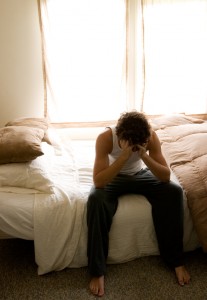 Depression occurs in up to 14 percent of kids ages 13 to 17 and can lead to risky sexual behaviors, substance abuse or even suicide. Unfortunately, few teens utilize mental health services that can help manage depression symptoms. But a study by Seattle Children’s Research Institute suggests parents play a strong role in helping teens receive mental health care.
Depression occurs in up to 14 percent of kids ages 13 to 17 and can lead to risky sexual behaviors, substance abuse or even suicide. Unfortunately, few teens utilize mental health services that can help manage depression symptoms. But a study by Seattle Children’s Research Institute suggests parents play a strong role in helping teens receive mental health care.
To find out why some depressed adolescents get help from mental health services and others do not, Seattle Children’s researchers studied 113 teens who screened positive for depression within non-profit health system Group Health. Despite the fact that all of the patients had insurance and access to mental health care, just 52 percent used mental health services.
Researchers were surprised to learn the adolescents’ characteristics – such as age, race or socio-economic status – made little difference in whether or not the teens were treated for depression.
Even more surprising, researchers learned youth with more severe cases of depression, including those who had thoughts of hurting themselves, were not more likely to be treated.
“Parents’ recognition of their child’s depression symptoms was the greatest determining factor of whether youth received mental health care services,” said David Breland, MD, MPH, lead author of the study.
The primary challenge for parents: it can be difficult to tell the difference between typical teen angst and a serious mental health problem.
“A lot of parents – especially those with no history of depression themselves – are not able to recognize the symptoms of depression,” Breland said. “If youth were screened we might better be able to identify depressed teens and get them the services they need.”
Signs of depression: What to look for
Breland and fellow researcher Cari McCarty, PhD, recommend parents watch for the following signs of depression in their children:
- At least 2 weeks of depressed mood, hopeless feelings or irritability
- Not wanting to do things they used to think were fun
- Increased or decreased sleep
- Increased or decreased appetite; weight changes
- Trouble concentrating
- Self-harming behaviors such as cutting or thoughts of suicide
“There’s a lot of value in checking in with kids and asking how they’re doing,” McCarty said. “Depression is not always obvious. It goes under the radar. You can have an adolescent who is very high functioning and yet screens high for depression. They’re not always showing behavioral issues or acting out, sometimes they’re suffering silently.”
If you are concerned your child may be depressed, Breland recommends contacting your pediatrician or family doctor immediately.
Resources:
- Understanding Depression
- Psychiatry and Behavioral Medicine
- Mental Health Warning Signs (video)
If you’d like to arrange an interview with Dr. David Breland please contact Seattle Children’s PR team at 206-987-4500 or [email protected].

